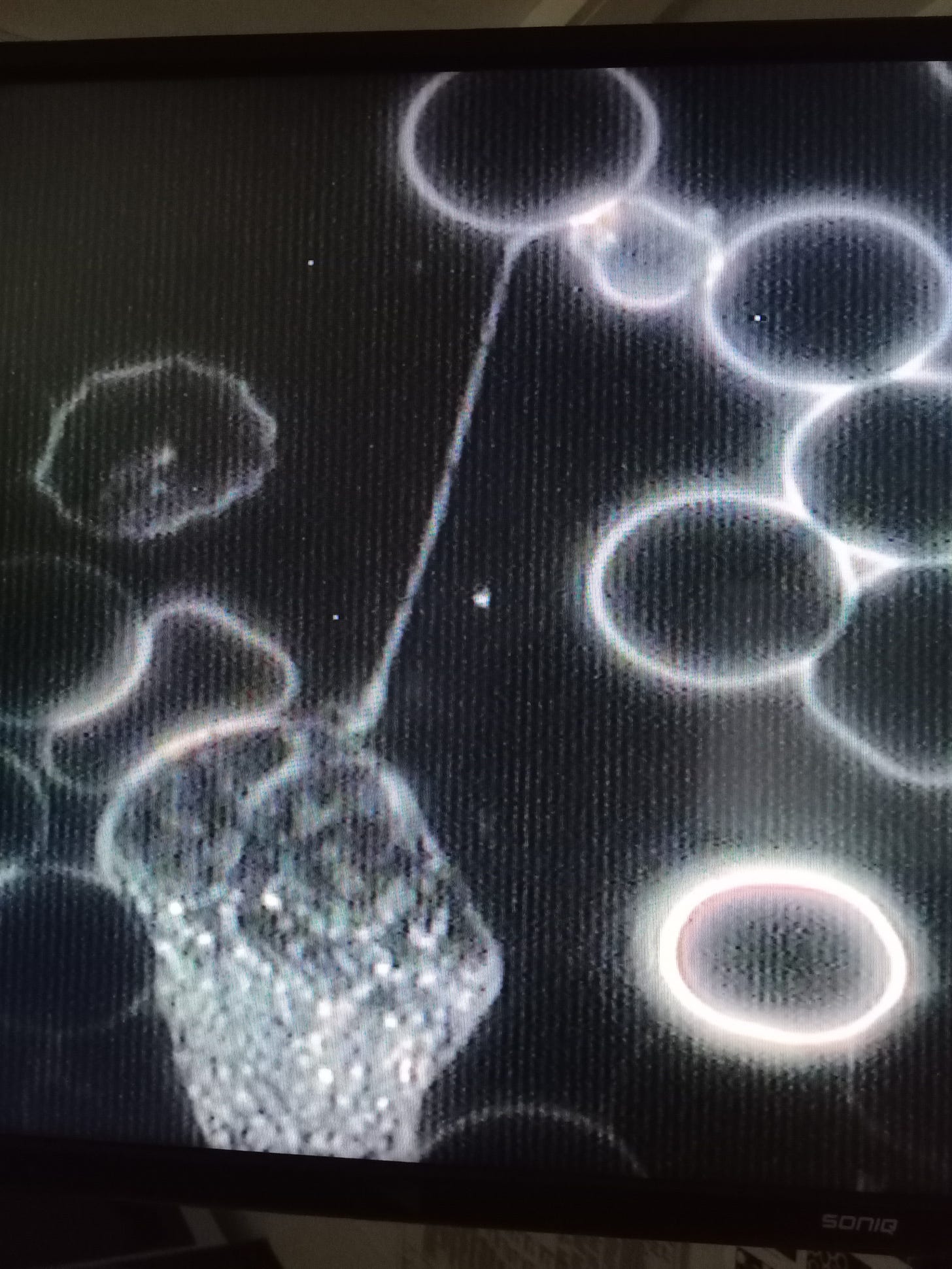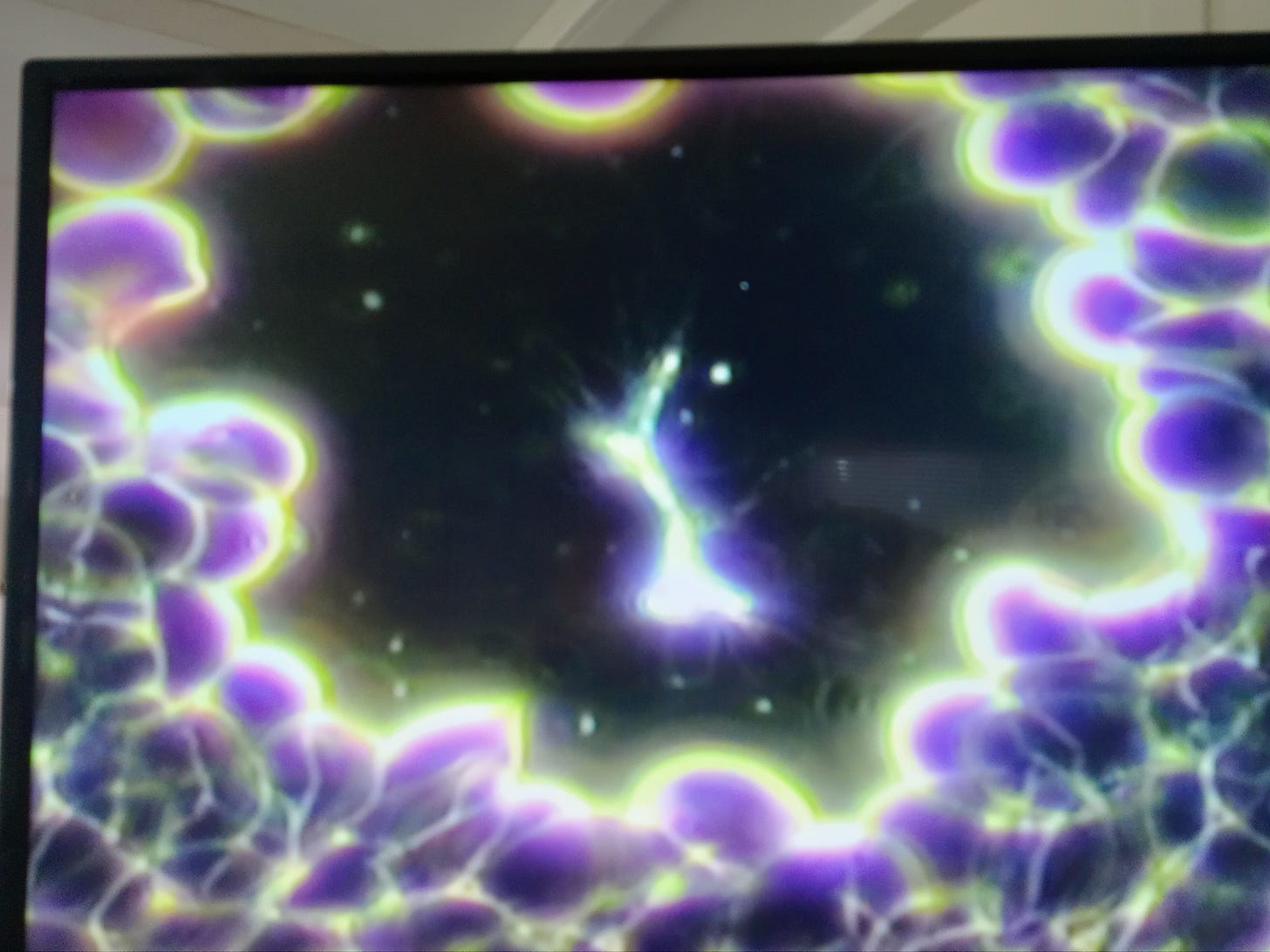Quick update from last post
Possible alternative natural origin on the neutrophil/string
I always try to keep an open mind and am definitely interested in any mainstream non “CT” explanation on what I’m finding.
Full disclosure - This doesn't mean Joshua is correct but he certainly MAY be and I believe far more experience then myself.
Also worth noting is the almost web like effectI had mentioned before.
The resource shared.
(Microfluidic capture of chromatin fibres measures neutrophil extracellular traps (NETs) released in a drop of human blood
Miyuki Sakuma et al. Lab Chip. 2022.)
https://pubmed.ncbi.nlm.nih.gov/35084421/
(Abstract
Neutrophils are the largest population of white blood cells in the circulation, and their primary function is to protect the body from microbes. They can release the chromatin in their nucleus, forming characteristic web structures and trap microbes, contributing to antimicrobial defenses. The chromatin webs are known as neutrophil extracellular traps (NETs). Importantly, neutrophils can also release NETs in pathological conditions related to rheumatic diseases, atherosclerosis, cancer, and sepsis. Thus, determining the concentration of NETs in the blood is increasingly important for monitoring patients, evaluating treatment efficacy, and understanding the pathology of various diseases.)
I would like to personally thank Joshua for giving me his honest opinion and more importantly a link/resource to justify his opinion. A small plug and an apology for the length of time since he gave me this link.
“Hmmm .. perhaps you could include BornFree and this link? https://bornfree.life/understanding-the-model/6/updated-disease-model-wip/45/ “
Please consider visiting his page
After a small run in on X I'll note that nothing shits me to tears more then some self proclaimed expert telling me their credentials and how good they are.
Worse yet when they go on to tell me it isn't what I think it is, and after I said Idk what “X’s“ are(no pun intended).
Obviously thats my twitter account, anyone is welcome to follow me. (Or not ;). Please don't hassle Crosta because I suspect she's misguided. The heart of grace account is a top chick.
i.e.
https://open.spotify.com/episode/5mRUDjvcvrd1WCascuUdyG?si=_nM5zC2TSDqipBlY2pH3Ow
I noticed Tess Lawrie has forwarded Dr Ana's newsletter and i know for a fact Dr Chetty in sth Africa is getting involved in the live blood so I believe this is going to start being recognised and investigated by a rapidly expanding skill set.
The weird German probably isn't happy but thats life, and fuck him and his owners and associates anyway.
People have to start considering that we're most likely in the middle of a global coup and it's too late once you’re in the box because gas is easyto turn on from outside bit not so easy to turn off from within..
I have some more photos to up load but I'm at work and tired.







At the risk of sounding like a raging self-promoter, I posted on boron recently.
I'm not jabbed, not a doctor, but have doctored the family for the last fifteen years and've been using boron for about seven years or more. (It's not toxic as commonly promoted.)
In research for the post, regulation of mRNA came up over and over again. I was going to make a feature of it but couldn't afford the time to study it specifically because boron is so valuable to so many other areas as well. I might do it in the future but getting folks to realise it's not poison seemed the most important aspect.
It has worked on me and even my teenager is balanced hormonally - it does so much, quite extraordinary- but it's considered poison by the pharmaceutical companies (which is as good as saying it's gold really, haha).
So anyway, I did a search for boron and neutrophils just now; I already know it strengthens cell walls and is a semi-conductor, relevant to blood, bones and brain. If nothing else it'll clear your head to help with further research.
(I wonder if you were the one asking about osteoporosis and arthritis? It's in the recent boron post).
Anyway below are notes from the just looked-up study on boron and neutrophils, RNA etc.:
https://journals.sagepub.com/doi/10.1177/2156587211407638
Neutrophil dog-whistle to start:
-Activation of neutrophils and phagocytes during the inflammation process results in the production of reactive oxygen species [...] that are used for microbicidal purposes. Excess reactive oxygen species are destroyed in reactions involving glutathione, superoxide dismutase, and catalase.
Evidence exists indicating that boron status can affect the destruction of reactive oxygen species. Boron supplementation (3.0 mg/d) significantly increased erythrocyte superoxide dismutase concentration in boron-deprived (0.25 mg/d) men and women.59 Low doses (eg, 5 mg/L) of boron were found to support antioxidant enzyme activities, including superoxide dismutase and catalase, in human blood cultures.
-How they think it might work...
This property results in boron as boric acid forming complexes with several biologically important sugars, including ribose. The fact that borate can stabilize ribose has given support to the speculation that early life on Earth was one in which RNA was the only genetically encoded component of biological catalysts.75 Without boron, RNA would have been unlikely to form spontaneously in prebiotic conditions because its ribose component would have decomposed under the harsh conditions of early Earth.
And from the end of the study:
-The evidence that boron is a bioactive beneficial trace element is substantial. The evidence has come from numerous laboratories that have used a variety of experimental models, including humans. Boron apparently has diverse effects through influencing a cell signalling system or the formation and/or activity of an entity involved in many biochemical processes. Findings have shown that boron is needed to complete the life cycle of some higher animals; in nutritional amounts, it promotes bone health, brain function, and the immune or inflammatory response; alleviates or decreases the risk for arthritis; facilitates the action or utilization of several hormones; and is associated with decreased risk for some cancers. This suggests that boron intakes above 1 mg/d could help people “live longer and better.”
For the record our family takes about 3mg-8mg per day.
Hey Damon, it would seem that you and I are on somewhat of a parallel journey, with somewhat of the same intent, and somewhat of the same grasp (or lack of) of the subject matter at hand. It's a steep learning curve, eh. But someone's gotta do it. Kudos to you for getting the message out there.